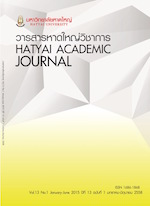Revelation of Weak Northern Thai Local Administration Internal Auditing in Detecting Risks
Main Article Content
Abstract
The prime objective of this study is to explore the crucial causes lead to ineffectiveness of the internal control and auditing systems in detecting corruption risks in Northern Thai local administrations. This study was investigated through local administration internal auditors in North of Thailand by using a valid questionnaire and semi-structured interviews. Descriptive statistics and factor analysis were used for analysing the questionnaires while a phenomenological research approach and content analysis based on Bandura’s theory of moral disengagement were used for analysing the interview transcripts. As a result of this study discovered that various factors contribute to the weakness of Northern Thai local administration internal auditing systems in detecting common risks consist of the lack of independence of internal auditing systems and teams which is difficult to achieve the determined internal auditing goals; a lack of officials’ cooperation and interest with internal control system especially from administrators and audited departments while a lack of important support and promotion from administrators to internal auditors’ professional prospects due to a lack of their knowledge and understanding to the importance and benefit of internal control and auditing systems. Similarly, the lack of internal audit team’s competency for dealing effectively with administrators and those audited officials also contributes to the ineffective local administration internal auditing systems in North of Thailand. Therefore, the whole causes above have been betided due to the ineffectiveness of Thai federal authorities with their enforcement of laws and regulations in detecting common risks especially corruption risks, this crisis must be solved before local administration internal auditing systems can work effectively.
Article Details
How to Cite
Kongrungchok, A. (2015). Revelation of Weak Northern Thai Local Administration Internal Auditing in Detecting Risks. Hatyai Academic Journal, 13(1), 63–73. retrieved from https://so01.tci-thaijo.org/index.php/HatyaiAcademicJournal/article/view/82448
Section
Research Article
All published articles are evaluated by three qualified peer reviewers from various institutions through a double-blind process, where reviewers do not know the authors’ identities and authors do not know the reviewers’ identities. The content and articles in the Hatyai Academic Journal reflect the authors’ views only and are neither the opinions of the editorial board nor the responsibility of Hatyai University. The Editorial Board of the Hatyai Academic Journal allows articles to be reproduced for academic purposes, on the condition that the original source is clearly cited.


